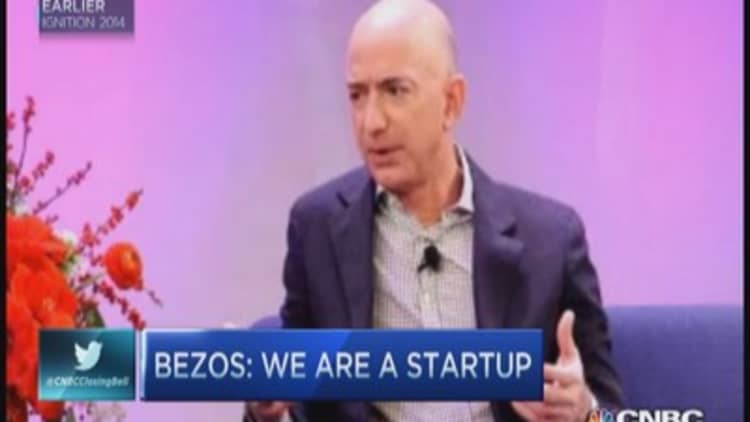For years, Amazon naysayers have warned that the e-commerce giant's ambition would drive it to compete ever more directly with the merchants who sell goods on Amazon's popular online marketplace. On Wednesday, the company is introducing its own line of diapers and baby wipes, which will only raise these fears.
Called Amazon Elements, the line of diapers and baby wipes will only be available to customers who belong to the Amazon Prime membership program, adding another item to the growing list of membership perks. By working directly with a manufacturer, Amazon will be able to price the brand aggressively, with a 40-count package of diapers starting at $7.99. That works out to about 19 cents a diaper, compared to competitor prices that mostly range from 24 cents to 34 cents.
As a result, some people will view the launch as a shot across the bow at the big diaper brands, Huggies and Pampers, that sell their products on Amazon. Sellers on Amazon already gripe that Amazon sells the same products as they do. Now it is building a direct relationship with a supplier that allows it to undercut some of its own partners in a more significant way.
Elements product pages will also include information about the materials used in the diapers and wipes and from where they are sourced. This level of transparency seems to be aimed at appealing to customers of the fast-growing diaper brand Honest, co-founded by the actress Jessica Alba, which prides itself on making safe, eco-friendly baby products. Honest does not sell its goods on Amazon, instead opting this summer for a distribution agreement with Target. Now it finds itself with a target on its back.
From from Re/code:
- What we learned about Amazon's CEO from rare appearance
- More Amazon Fire phones coming, Jeff Bezos signals
- Amazon confirms it will deliver fresh groceries in NY
The launch comes a year after I reported that Amazon was recruiting people to help create its own brand of products in the larger category known as consumables. Private-label brands such as Elements can allow retailers to keep prices low since there is no intermediary between itself and the manufacturer. For Amazon, it can help it boost margins on a product that is ordered with high frequency, or simply add a quality product at a price point others will be hard pressed to match. Grocer Trader Joe's has built an entire business on private labeling, while Target and Costco own successful private-label brands — including their own lines of baby diapers.
Read MoreOops! Amazon sent this man $5K of free stuff
While Prime is popular with families with young children, the introduction of an Amazon-branded product does not guarantee success. Amazon has introduced other brands over the years, but they largely remain under the radar. It sells a line of batteries and electronics accessories called Amazon Basics, a line of bedding dubbed Pinzon and an outdoor furniture brand called Strathwood. It'll also be difficult to convince parents to switch if they already buy a brand that keeps their kids dry and happy.

The launch also underscores Amazon's increasing focus on building more value into its Prime membership program, which costs $99 a year. What started essentially as a $79 shipping membership, providing two-day delivery on a big catalogue of products for no extra fee, has grown to encompass access to free streaming and downloads of TV shows, movies and music. The company has also been pitching clothing retailers on giving Prime members shipping benefits when they shop on the other brand's own website, though only one fashion retailer has taken it up on the offer thus far. Either way, the impetus for retaining Prime members and adding new ones is clear: They spend in a year about double what non-Prime members do, according to several studies.
Read MoreComing to a public bathroom near you: Stall malls
Now, Amazon is adding a layer of exclusivity into the program. An Amazon spokeswoman declined to say whether the Elements baby products will eventually be available to non-Prime members. But since Amazon wants to keep making a Prime membership more valuable, my guess is they will not.
CNBC's parent NBC Universal is an investor in Re/code's parent Revere Digital, and the companies have a content-sharing arrangement.

